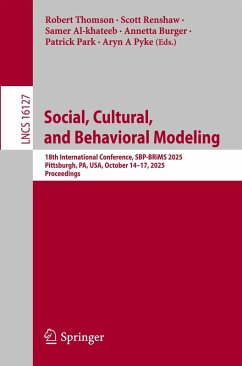
Social, Cultural, and Behavioral Modeling
12th International Conference, SBP-BRiMS 2019, Washington, DC, USA, July 9-12, 2019, Proceedings
Herausgegeben: Thomson, Robert; Bisgin, Halil; Dancy, Christopher; Hyder, Ayaz

PAYBACK Punkte
22 °P sammeln!
This book constitutes the proceedings of the 12th International Conference on Social, Cultural, and Behavioral Modeling, SBP-BRiMS 2019, held in Washington, DC, USA, in July 2019.The total of 28 papers presented in this volume was carefully reviewed and selected from 72 submissions. The papers in this volume show, people, theories, methods and data from a wide number of disciplines including computer science, psychology, sociology, communication science, public health, bioinformatics, political science, and organizational science. Numerous types of computational methods are used include, but n...
This book constitutes the proceedings of the 12th International Conference on Social, Cultural, and Behavioral Modeling, SBP-BRiMS 2019, held in Washington, DC, USA, in July 2019.
The total of 28 papers presented in this volume was carefully reviewed and selected from 72 submissions. The papers in this volume show, people, theories, methods and data from a wide number of disciplines including computer science, psychology, sociology, communication science, public health, bioinformatics, political science, and organizational science. Numerous types of computational methods are used include, but not limited to, machine learning, language technology, social network analysis and visualization, agent-based simulation, and statistics.
The total of 28 papers presented in this volume was carefully reviewed and selected from 72 submissions. The papers in this volume show, people, theories, methods and data from a wide number of disciplines including computer science, psychology, sociology, communication science, public health, bioinformatics, political science, and organizational science. Numerous types of computational methods are used include, but not limited to, machine learning, language technology, social network analysis and visualization, agent-based simulation, and statistics.












